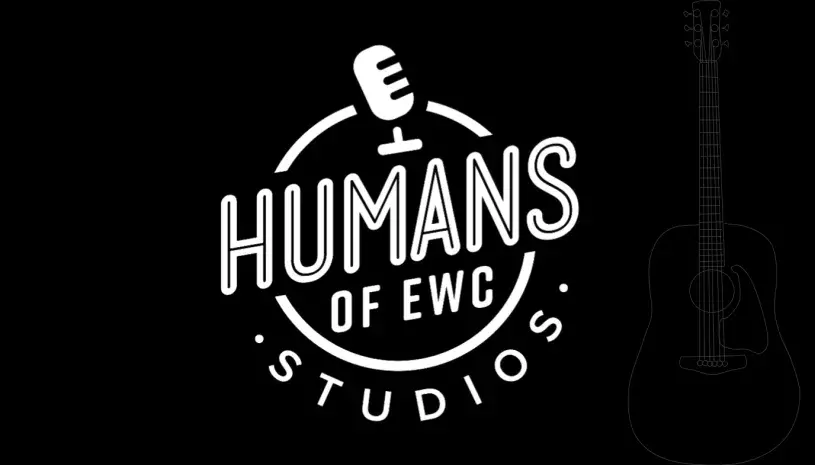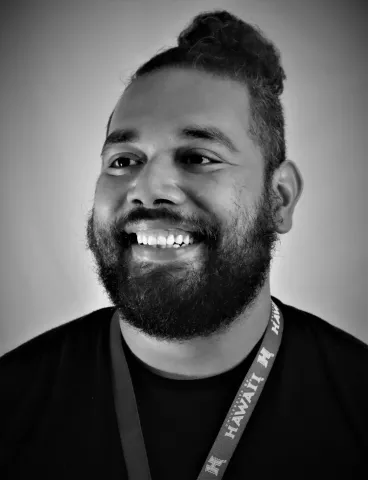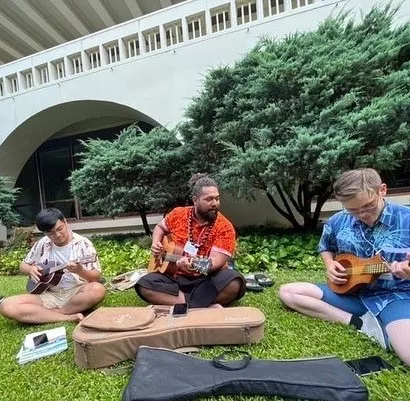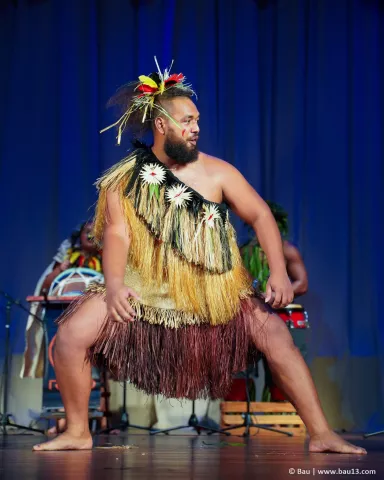Error message
Humans of EWC Studios offers a window into our community for those interested in learning about EWC through a more personal lens. The feature below includes extended materials from our Humans interview with performer, storyteller, and Graduate Degree Fellowship recipient Jay-J Taukave.
Lyrics:
None will know that you're quiet,
or fluid, boundless, and free
none will care that you're nothing,
but you are everything to me.
From the mountains to the sea,
you've given me life from within.
And I hear my ancestors sing,
of what was and what is to be.
A drop of your love, so beautiful,
living in me, in society.
Precious you are,
share your story for all
all to hear.
Clear as the springs; rough as the seas.
Pouring as rain to the streams.
Rivers and the valleys, alive to me.
Flow as my forefathers did.
Without you I am nothing.
Without you there's no hope.
Quench my thirst to believe.
You're everywhere, you matter to me.
A drop of your love, so beautiful,
living in me, in society.
Precious you are,
Share your story for all to hear.
A drop of your love, so beautiful,
living in me, in society.
Precious you are,
Share your stories for all,
All to hear.
You're listening to an EWC EP Studio feature. I'm Benjamin Fairfield. We're here today with Jay-J, our special guest who will introduce himself.
Noa'ia 'e mauri, bula vinaka. Welcome. My name is John Jimione Brandon Taukave. I go by the name Jay-J here. I come from the island of Rotuma in the nation of Fiji. Born and raised in Suva. I'm a student here doing my masters for the Center for Pacific Island Studies at UH Mānoa. And I'm also a Graduate Degree Fellowship member with the East-West Center. On scholarship here. And I'm living at Hale Mānoa.
Thank you Jay-J. Can you tell us more about your experience living on campus here at EWC?
Hmm! Hale Mānoa, there's so many things to talk about Hale Mānoa. First and foremost is the diversity of students from different backgrounds, getting to meet them, getting to know their stories, and, you know, learning from each other's experiences is for me, both as a scholar and as an artist as well. So, learning from their backgrounds, their stories, their families, their experiences inspires me and the work that I do in terms of my art and the academic studies that I do with Pacific Island studies. So that first and foremost is the diversity at Hale Mānoa. Second is the gift of community and family that Hale Mānoa shares. You know, meeting each other from the kitchens, you know, sharing food with each other, as well as meeting together at (Hale) Hālāwai for different events, talking story, sharing kava with people from different backgrounds, listening to music, and yeah! just jamming and talking story. That's the beautiful I thing I love about the community here at East-West Center.
Can you talk a little bit more about a specific time when you were able to share your story, your culture, with fellow participants at the center?
There have been a few events. Last semester I had the opportunity to hold these Hanuju story sessions. There were also something like open mics, so it was an an opportunity for me to create a space where I could activate the "Wa" and the "Tauleva," meaning the relationships with everyone in that space, in sharing their stories through performance. Whether it was spoken word, whether it was music, whether it was dance, whether it was poetry, whether it was story telling as well. It was also an opportunity for me to show everyone where I come from because not many people know where Rotuma is, so it was a chance for me to share about what my island is, the culture and the music, as well as the beauty of what my culture is and sharing it with everyone, the stories that I got to share through my music. It was a beautiful experience, and I got to see, you know, first hand, people know more about Rotuma and know more about the Fijian culture as well. And sharing that with everyone, with the students...not only students We had students from East-West Center, students from UH, alumni from East-West Center, the general public, you know, it was a good family event. And the Kava, you know, sharing kava with everyone, and it just made the space, it really activated the Wa in that space, and that's what I really appreciated about it. Creating these spaces where you get to bring people from different backgrounds and activating that mana within that space, and that was a beautiful thing that I really enjoyed About the Hanuju story living series.
Can you tell us about the song that you're going to share with us today?
The song is an original that I wrote last semester. It's called Tạnu, and Tạnu in the Rotuman language means "water." It's sort of my personal relationship and conversation with water as a person. And my thoughts about the space between myself and water, what that space means for me. And how important water is to me, not only as a resource but as a living entity that continues to be fluid and vast, and it deals with all of these different notions of the ocean, the rain, the rivers, the streams, the fresh water pools, the aquifers, and how Tạnu provides for us, and the relationships we share, not only today but the relationships we share with our ancestors and their voyages and their livelihoods and how important water was for them, and how it will be important for us today and for the legacy that we leave. And it gives us a deep reflection about how we want our children or our future generations to appreciate this resource. Not only as water that gives us life, but water as the stories and the memories that water holds to us in terms of our identities, in terms of our ways of living, our ways of knowledge, our epistemologies. So it's my reflection in having that conversation with water as a living entity, and my relationship with it. So that's Tạnu.
Thank you, Jay-J. I'm excited to hear the song, but I also know you wanted to acknowledge some people before we play that feed into your development as an artist, right?
I also wanted to acknowledge those who have helped me on this journey. My Elders Gagaj Taimanav, the late Rrev. Emotama Pene, and my mom, Violet Taukave, and my brother, Samuela Konusi Taukave, and also my creative family back home, Rako Pasefika, as they have been a big part of giving me the inspiration in carrying out the work that I currently do about reconnecting back to my Rotuman heritage, and being with Rako Pasefika under the guidance of Letila Mitchell, I have to give credit to her because she has been a big part of who I am and this journey that I am currently taking here at the university of Hawai‘i. And I just want to acknowledge her and Rako's presence as well as my family's presence in my life as well. So big shout out to them. Thank you.
A note on the cello: with Jay-J's permission, the studio producer was invited to overlay a few cello tracks with the intention of expressing some of Tạnu's characteristics (boundlessness, fluidity, dripping, flowing, etc).
Humans of EWC Studios offers a window into our community for those interested in learning about EWC through a more personal lens. The feature below includes extended materials from our Humans interview with performer, storyteller, and Graduate Degree Fellowship recipient Jay-J Taukave.
Lyrics:
None will know that you're quiet,
or fluid, boundless, and free
none will care that you're nothing,
but you are everything to me.
From the mountains to the sea,
you've given me life from within.
And I hear my ancestors sing,
of what was and what is to be.
A drop of your love, so beautiful,
living in me, in society.
Precious you are,
share your story for all
all to hear.
Clear as the springs; rough as the seas.
Pouring as rain to the streams.
Rivers and the valleys, alive to me.
Flow as my forefathers did.
Without you I am nothing.
Without you there's no hope.
Quench my thirst to believe.
You're everywhere, you matter to me.
A drop of your love, so beautiful,
living in me, in society.
Precious you are,
Share your story for all to hear.
A drop of your love, so beautiful,
living in me, in society.
Precious you are,
Share your stories for all,
All to hear.
You're listening to an EWC EP Studio feature. I'm Benjamin Fairfield. We're here today with Jay-J, our special guest who will introduce himself.
Noa'ia 'e mauri, bula vinaka. Welcome. My name is John Jimione Brandon Taukave. I go by the name Jay-J here. I come from the island of Rotuma in the nation of Fiji. Born and raised in Suva. I'm a student here doing my masters for the Center for Pacific Island Studies at UH Mānoa. And I'm also a Graduate Degree Fellowship member with the East-West Center. On scholarship here. And I'm living at Hale Mānoa.
Thank you Jay-J. Can you tell us more about your experience living on campus here at EWC?
Hmm! Hale Mānoa, there's so many things to talk about Hale Mānoa. First and foremost is the diversity of students from different backgrounds, getting to meet them, getting to know their stories, and, you know, learning from each other's experiences is for me, both as a scholar and as an artist as well. So, learning from their backgrounds, their stories, their families, their experiences inspires me and the work that I do in terms of my art and the academic studies that I do with Pacific Island studies. So that first and foremost is the diversity at Hale Mānoa. Second is the gift of community and family that Hale Mānoa shares. You know, meeting each other from the kitchens, you know, sharing food with each other, as well as meeting together at (Hale) Hālāwai for different events, talking story, sharing kava with people from different backgrounds, listening to music, and yeah! just jamming and talking story. That's the beautiful I thing I love about the community here at East-West Center.
Can you talk a little bit more about a specific time when you were able to share your story, your culture, with fellow participants at the center?
There have been a few events. Last semester I had the opportunity to hold these Hanuju story sessions. There were also something like open mics, so it was an an opportunity for me to create a space where I could activate the "Wa" and the "Tauleva," meaning the relationships with everyone in that space, in sharing their stories through performance. Whether it was spoken word, whether it was music, whether it was dance, whether it was poetry, whether it was story telling as well. It was also an opportunity for me to show everyone where I come from because not many people know where Rotuma is, so it was a chance for me to share about what my island is, the culture and the music, as well as the beauty of what my culture is and sharing it with everyone, the stories that I got to share through my music. It was a beautiful experience, and I got to see, you know, first hand, people know more about Rotuma and know more about the Fijian culture as well. And sharing that with everyone, with the students...not only students We had students from East-West Center, students from UH, alumni from East-West Center, the general public, you know, it was a good family event. And the Kava, you know, sharing kava with everyone, and it just made the space, it really activated the Wa in that space, and that's what I really appreciated about it. Creating these spaces where you get to bring people from different backgrounds and activating that mana within that space, and that was a beautiful thing that I really enjoyed About the Hanuju story living series.
Can you tell us about the song that you're going to share with us today?
The song is an original that I wrote last semester. It's called Tạnu, and Tạnu in the Rotuman language means "water." It's sort of my personal relationship and conversation with water as a person. And my thoughts about the space between myself and water, what that space means for me. And how important water is to me, not only as a resource but as a living entity that continues to be fluid and vast, and it deals with all of these different notions of the ocean, the rain, the rivers, the streams, the fresh water pools, the aquifers, and how Tạnu provides for us, and the relationships we share, not only today but the relationships we share with our ancestors and their voyages and their livelihoods and how important water was for them, and how it will be important for us today and for the legacy that we leave. And it gives us a deep reflection about how we want our children or our future generations to appreciate this resource. Not only as water that gives us life, but water as the stories and the memories that water holds to us in terms of our identities, in terms of our ways of living, our ways of knowledge, our epistemologies. So it's my reflection in having that conversation with water as a living entity, and my relationship with it. So that's Tạnu.
Thank you, Jay-J. I'm excited to hear the song, but I also know you wanted to acknowledge some people before we play that feed into your development as an artist, right?
I also wanted to acknowledge those who have helped me on this journey. My Elders Gagaj Taimanav, the late Rrev. Emotama Pene, and my mom, Violet Taukave, and my brother, Samuela Konusi Taukave, and also my creative family back home, Rako Pasefika, as they have been a big part of giving me the inspiration in carrying out the work that I currently do about reconnecting back to my Rotuman heritage, and being with Rako Pasefika under the guidance of Letila Mitchell, I have to give credit to her because she has been a big part of who I am and this journey that I am currently taking here at the university of Hawai‘i. And I just want to acknowledge her and Rako's presence as well as my family's presence in my life as well. So big shout out to them. Thank you.
A note on the cello: with Jay-J's permission, the studio producer was invited to overlay a few cello tracks with the intention of expressing some of Tạnu's characteristics (boundlessness, fluidity, dripping, flowing, etc).





